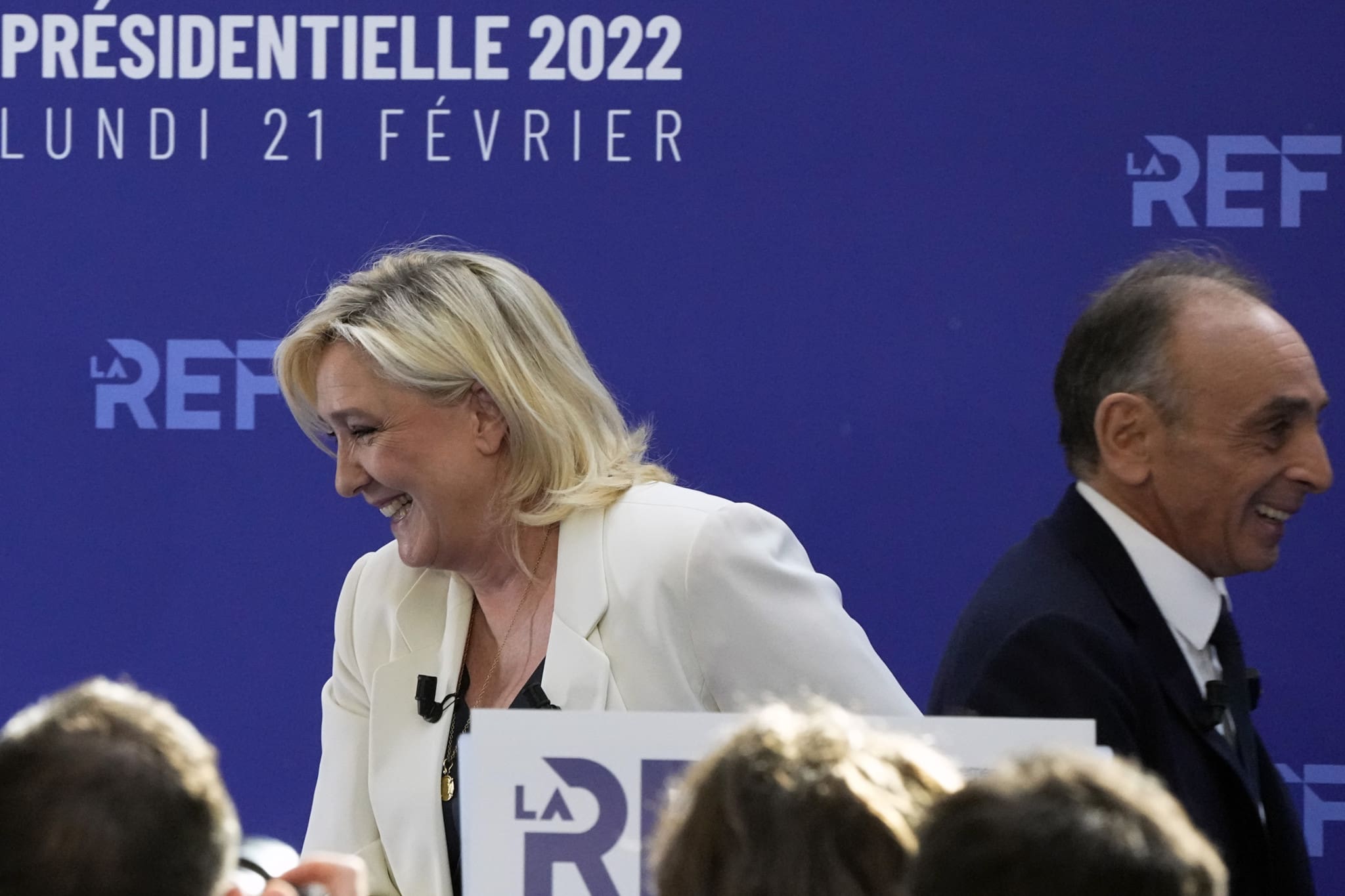As we predicted on Remix News just after Emmanuel Macron’s victory in the presidential elections, the divisions of “the stupidest right in the world,” as the French themselves call it, have made possible a landslide victory for the left in the first round of the legislative elections on June 12.
Le Pen achieved a stunning success by some measures during her presidential run, scoring an election tally never before achieved by her party despite relentlessly negative media coverage and a cordon sanitaire from nearly every other major party in the country. It may seem incredible, but despite this achievement, the only ambition of Le Pen’s National Rally party for the parliamentary elections was to be in a position to form a parliamentary group, that is to say, to have at least 15 deputies.
Refusing any alliance with the right and concentrating on nipping in the bud Éric Zemmour’s Reconquest party, which overshadowed the National Rally (RN) and attracted its last truly conservative leaders, Marine Le Pen’s RN ceded the electoral playing field to Emmanuel Macron and Jean-Luc Mélenchon, the Islamo-leftist leader of La France Insoumise (“France Unbowed”, LFI).
[pp id=39053]
At the head of the NUPES, an alliance of the left bringing together LFI, the Socialists, the Communists, and the Greens, Mélenchon is the only one after the first round of the legislative elections who is in a position to threaten the absolute majority of President Macron’s Ensemble (“Together”) coalition. And whatever happens, it is Macron’s center-left and Mélenchon’s radical left that will overwhelmingly populate the benches of the National Assembly after the second round on June 19.
Even if RN candidates qualified for the second round in 208 constituencies out of 577, which is a historical record, few are in a position to win in the second round.
The French legislative elections are held under a two-round majority system with only one seat to be filled in each constituency. To win in the first round, one must obtain more than 50 percent of the votes cast, representing at least 25 percent of registered voters. Hence, with a low turnout, Marine Le Pen did not win in the first round despite having obtained 55 percent of the vote in the 11th constituency of the Pas-de-Calais department. To qualify for the second round of voting, one needs the votes of at least 12.5 percent of registered voters. With a turnout of 47 percent, this means that there are very few “triangulars”, i.e. run-offs with three candidates instead of two.
[pp id=34482]
This makes it difficult for the National Rally (RN) candidates to win when all the other major parties are calling for them not to be voted for, regardless of the other candidates running. That is why an alliance of the right with the parties of Éric Zemmour and Nicolas Dupont-Aignant, as well as with the right-wing of the center-right party Les Républicains (LR), could have won a much larger number of seats, including for the RN itself.
In the absence of such an alliance, it is Macron’s ultra-progressive, Euro-federalist center and Mélenchon and his allies’ wokeist left that will sweep the vast majority of seats in the National Assembly, which is the house of parliament that has the final say in case of disagreement with the Senate, and this is happening in a big part thanks to Marine Le Pen.
For French right-wingers, it is little consolation to see the center-right, Les Républicains, a party that has betrayed them so many times in the past by bowing to the left on all important issues, score a historically low 11.3 percent of the national vote in the first round.
If Macron’s Ensemble coalition does not get an absolute majority next Sunday, the center-right will probably be a useful ally because they have never been a real opposition to them, but they will still have to negotiate with them on every bill, which will put the president in an uncomfortable situation.
In the first round, which took place on June 12, the presidential coalition, made up of his En Marche party and a few minor allies, obtained only 25.9 percent of the vote, which is historically low for the party of a newly re-elected president. What’s more, such a low result was achieved with a historically low turnout.
The candidates who came out on top in the first round were those of the NUPES coalition formed by the left and the far-left under the leadership of Jean-Luc Mélenchon, with 26.1 percent of the vote at the national level. Mélenchon can thus continue his campaign for an unlikely absolute majority to become prime minister.
However, due to the voting system and based on their forecasts of voters’ second choices for those whose candidates did not make it to the second round, pollsters predict that the presidential coalition will win the most seats in the end, with between 255 and 295 seats (the absolute majority being 289 seats), compared to somewhere between 150 and 190 seats for the NUPES. And the coalition of Les Républicains with the centrist UDI party can count on, despite its very low result in the percentage of the vote at the national level in the first round, between 50 and 80 seats, with only 20 to 45 seats for the National Rally, which obtained 18.7 percent of the vote in the first round.
This would certainly represent a very strong gain for Le Pen’s party, which had only 7 seats in the National Assembly after obtaining 13 percent of the vote in the 2017 legislative elections, but its biggest achievement is to have prevented Éric Zemmour’s Reconquest party from entering parliament since it obtained only 4.3 percent of the vote at the national level. For Éric Zemmour himself, he scored only 23.2 percent of the vote in the 4th constituency of the Var department, and received 800 votes less than the National Rally’s candidate, which means he did not qualify.
Having a fragmented opposition on his right, Emmanuel Macron was therefore right to focus his campaign on his opposition from the left, which explains why he appointed the most woke minister for education and youth in the country’s history, the racialist, radically woke Pap Ndiaye.
[pp id=37306]
The appointment of Ndiaye represents an extreme transformation of French politics: under Macron’s first term, the higher education minister publicly criticized the presence of Islamo-leftist ideology in the academic world and vowed to fight it, and the education minister was supposedly Macron’s most conservative minister, which was meant to lure voters from the right. Today, the minister for education and youth comes from the very circles that were then criticized by both ministers, and he seems closer ideologically to Jean-Luc Mélenchon’s La France Insoumise than to Emmanuel Macron’s centrist-progressive party.
It should be noted in passing that, after multiple attacks and violence of which they and their campaign staff had been victims, all the Parisian candidates of Éric Zemmour’s Reconquest party had to turn to the police prefect to ask him to ensure their safety, and there have been other attacks throughout the country, including one candidate who had her house burned down. However, it is the same police prefect who tried to blame the Liverpool fans for the attacks by thugs and police against the people who came to watch the Liverpool-Real Madrid match on May 28, and the same police prefect who then did not bother to requisition the video surveillance recordings, which were therefore erased after seven days.
[pp id=38030]
In any case, this confirms once again that it is France, and not Hungary, that should have had its elections closely monitored by the OSCE this year.
As for Marine Le Pen, having a parliamentary group, however modest, in the National Assembly, will enable her to realize her ambition, which is, according to her niece Marion Maréchal, not to put an end to the cordon sanitaire or even bother to win elections and govern her country, but only to be on the good side of the cordon sanitaire. These ambitions represented all the more reason for Le Pen not to ally with people like Zemmour, even if France is to fall hostage to the radical left or, to put it in the words of left-wing philosopher Michel Onfray, to a president and his opponent Mélenchon, who despite their differences have “in common their hatred for France.”





